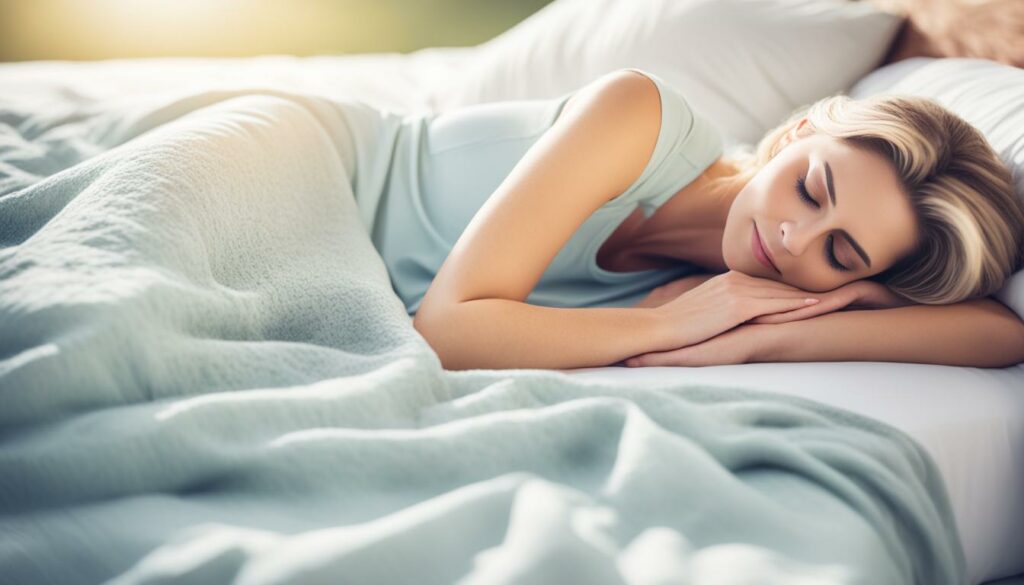Did you know that getting enough sleep can significantly impact your sexual health? Sleep is not only crucial for physical and mental well-being but also plays a vital role in our sexual lives.
Numerous studies have shown the powerful connection between sleep and sexual health, emphasizing the importance of prioritizing restful nights. From enhancing libido to improving sexual performance, sleep can work wonders in the bedroom.
So, if you’re looking to take your intimate moments to the next level, it’s time to focus on improving your sleep quality and duration.
Key Takeaways:
- Sleep and sexual health are interconnected aspects of overall well-being.
- Sleep deprivation and sleep disorders can negatively influence libido and arousal.
- Prioritizing communication and sleep health can improve both sex and sleep.
- Maintaining a regular sleep schedule and creating a relaxing bedtime routine are key for better sleep.
- Seeking treatment for sleep disorders can help in enhancing sexual health.
The Relationship Between Sleep and Sex
Sleep and sex share a unique and intricate relationship that goes beyond basic physical and emotional needs. The quality and quantity of sleep can significantly impact sexual performance and overall sexual health.
Sleep deprivation and sleep disorders can have detrimental effects on sexual desire and arousal. When individuals do not get enough sleep, their hormone levels, particularly testosterone, can become imbalanced. This imbalance can lead to a decrease in libido, making it more challenging to engage in sexual activities.
Lack of sleep can also contribute to sexual dysfunction. Sleep deprivation can cause fatigue, impaired concentration, and mental fog, which can all affect sexual performance negatively. The body needs proper rest for optimal sexual function.
On the other hand, sex can be beneficial for sleep. Engaging in sexual activity before bedtime can induce relaxation, reduce stress, and enhance sleep quality. The release of endorphins and oxytocin during sexual activity promotes feelings of calmness and contentment, making it easier to fall asleep and experience a more restful night.
It’s worth noting that sleep responses to sex can vary between men and women. Research suggests that men tend to feel sleepier after engaging in sexual activity compared to women. This difference in sleepiness levels may be attributed to biological and physiological factors, such as hormonal fluctuations.
“Quality sleep is essential for maintaining a healthy sex life and overall well-being.”
A comprehensive understanding of the relationship between sleep and sex highlights the importance of prioritizing restful sleep for optimizing sexual health.
By recognizing the bidirectional and complex nature of this relationship, individuals can make conscious efforts to improve their sleep habits, ultimately enhancing their sexual performance and overall well-being.
The Importance of Sleep for Sexual Health
Sleep is crucial for maintaining overall well-being, including sexual health. Getting a restful and uninterrupted night’s sleep is essential for enhancing sexual function and satisfaction. Adequate sleep duration and sleep quality play a significant role in sexual health, impacting libido, arousal, and performance.
Poor sleep can lead to sexual dysfunction and decreased sexual desire. It can disrupt hormone regulation, elevate stress levels, and impair cognitive function, all of which can negatively impact sexual experiences.
Gender and sex-based differences in sleep can also influence sexual health. Men and women may have varying sleep needs and patterns, which can affect their sexual well-being differently. Understanding these differences and addressing them can contribute to improved sexual health for individuals of all genders.
Sleep disorders like insomnia and sleep apnea can further exacerbate sexual dysfunction. These conditions disrupt sleep quality and hinder rejuvenating rest, leading to reduced sexual desire, performance, and satisfaction. Identifying and managing sleep disorders is crucial in addressing sexual health concerns.
By prioritizing the importance of restful sleep and incorporating healthy sleep practices, individuals can optimize their sexual health. Establishing a consistent sleep schedule, creating a sleep-friendly environment, and adopting relaxation techniques can all contribute to better sleep quality and, consequently, improved sexual well-being.
Benefits of Restful Sleep for Sexual Health
Restful sleep offers numerous benefits for sexual health:
- Enhances libido and sexual desire
- Regulates hormone production, including testosterone
- Reduces stress and anxiety, promoting relaxation and intimacy
- Increases energy levels and stamina
- Improves mood and emotional well-being
Sleep Disorders and Sexual Dysfunction
Common sleep disorders that can contribute to sexual dysfunction:
- Insomnia: characterized by trouble falling asleep, staying asleep, or waking up too early
- Sleep Apnea: a condition where breathing repeatedly starts and stops during sleep, leading to poor sleep quality
Addressing these sleep disorders with appropriate medical interventions can significantly improve sexual health and overall well-being.
| Sleep Disorder | Impact on Sexual Health |
|---|---|
| Insomnia | Decreased sexual desire, difficulty achieving orgasm, and reduced sexual satisfaction |
| Sleep Apnea | Erectile dysfunction in men, decreased sexual desire in both men and women, and increased risk of sexual dysfunction |
Proactively addressing sleep disorders and improving sleep quality can have a positive impact on sexual health, fostering a fulfilling and satisfying intimate life.

Sleep Tips for Enhancing Sexual Health
Sleep plays a vital role in our overall well-being, including our sexual health. If you’re looking to improve your sexual well-being and performance, incorporating good sleep habits into your routine is essential. Follow these sleep tips to enhance your sexual health:
Maintain a Regular Sleep Schedule
Regulating your circadian rhythm by sticking to a consistent sleep schedule can promote healthier sleep patterns and enhance your sexual well-being. Go to bed and wake up at the same time every day, even on weekends.
Create a Relaxing Bedtime Routine
Establishing a relaxing bedtime routine can signal to your body that it’s time to sleep, helping you unwind and prepare for restorative rest. Consider activities like reading a book, taking a warm bath, or practicing relaxation techniques like deep breathing or meditation.
Create a Sleep-Friendly Environment
Your sleep environment can significantly impact the quality of your sleep. Ensure your bedroom is dark, cool, and quiet to promote optimal sleep conditions. Use blackout curtains, earplugs, or a white noise machine if necessary.
Avoid Consuming Caffeine and Alcohol Close to Bedtime
Caffeine and alcohol can disrupt your sleep and negatively impact sexual performance. Avoid consuming these substances close to bedtime to ensure a night of quality rest.
Limit Daytime Naps
If you find yourself struggling to sleep at night, it may be beneficial to limit daytime naps to one hour or less. Excessive daytime napping can interfere with your ability to fall asleep or stay asleep during the night.
Consider Natural Remedies
Some natural remedies like melatonin or supplements that promote relaxation may help improve sleep quality. Consult with a healthcare professional before incorporating any new supplements into your routine.
By prioritizing sleep and following these sleep tips, you can enhance both your sleep quality and sexual well-being. Remember, a restful night’s sleep can significantly contribute to improved sexual performance and overall satisfaction.
The Effects of Sleep on Sexual Function
Sleep deprivation can have a significant impact on sexual function and desire, affecting both men and women. Lack of sleep can lead to decreased sexual desire and arousal, making it challenging to maintain a satisfying sex life.
Sleep deprivation and sexual desire: Sleep deprivation can negatively affect sexual desire, particularly in women. Studies have shown that sleep-deprived women experience lower levels of sexual desire and are less responsive to sexual stimuli.
Sleep deprivation and erectile dysfunction: Sleep disorders, such as insomnia and sleep apnea, have been linked to an increased risk of erectile dysfunction in men. Limited or poor-quality sleep can impair erectile function and make it difficult to achieve and maintain an erection.
Poor sleep can also impact decision-making processes, leading to an increased likelihood of engaging in risky sexual behavior. When sleep-deprived, individuals may be more impulsive and less able to make sound judgments, potentially putting themselves at risk.
“Sleep deprivation can impair decision-making processes, making individuals more likely to engage in risky sexual behavior.”
In addition to affecting libido and arousal, sleep deprivation can contribute to emotional and relationship issues that impact sexual activity. Chronic sleep deprivation can lead to feelings of irritability, mood swings, and decreased emotional intimacy, all of which can negatively affect sexual satisfaction.
Table: Sleep Deprivation and Sexual Function
| Sleep Deprivation | Effects on Sexual Function |
|---|---|
| Sleep deprivation in women | Decreased sexual desire and responsiveness |
| Sleep disorders (insomnia, sleep apnea) | Increased risk of erectile dysfunction in men |
| Chronic sleep deprivation | Emotional and relationship issues affecting sexual activity |
Sleep disruption can lead to reduced intimacy and satisfaction in sexual relationships. When individuals are sleep-deprived, they may have less energy, focus, and overall interest in engaging in sexual activity.
It’s important to prioritize sleep and address any sleep disorders or issues that may be impacting sexual health and function.

Sleep Recommendations for Improving Sexual Health
Sleep hygiene plays a crucial role in promoting sexual health and overall well-being. By following these tips, you can improve your sleep quality and enhance your sexual health.
Create a Comfortable Sleep Environment
Ensure your sleep environment is conducive to quality sleep. Keep your bedroom cool, dark, and quiet. Invest in a comfortable mattress and pillows that support your body. Use blackout curtains or an eye mask to block out any external light. Consider using earplugs or a white noise machine to drown out any disruptive sounds.
Establish a Consistent Sleep Schedule
Stick to a regular sleep schedule by going to bed and waking up at the same time every day, even on weekends. This helps regulate your body’s internal clock and promotes better sleep. Avoid napping for extended periods during the day as it can interfere with your ability to fall asleep at night.
Avoid Sleep Disruptors
Avoid engaging in stimulating activities or consuming heavy meals close to bedtime. Limit your exposure to technology, such as smartphones and tablets, before bed as the blue light emitted can interfere with your sleep. Instead, engage in relaxing activities like reading a book or taking a warm bath to prepare your body for sleep.
Seek Medical Evaluation and Treatment
If you suspect that you may have a sleep disorder, seek medical evaluation and treatment. Sleep disorders like insomnia and sleep apnea can have a significant impact on sexual health. Consult with a healthcare professional to explore treatment options and address any underlying sleep issues.
Engage in Regular Physical Activity
Regular exercise can help improve sleep quality. Engage in physical activity during the day, but avoid exercising too close to bedtime as it may interfere with your ability to fall asleep. Exposure to natural light, especially in the morning, can also help regulate your sleep-wake cycle.
Incorporate Relaxation Techniques
Before bed, incorporate relaxation techniques into your nightly routine. Try deep breathing exercises, meditation, or gentle stretching to help calm your mind and prepare your body for sleep. Avoid stimulating activities or discussions that may increase stress or anxiety before bedtime.
Prioritize Open Communication
Openly communicate with your partner about any relationship or emotional issues that may be affecting your sleep and sex life. Addressing these concerns can contribute to a healthier and more fulfilling sexual relationship.
Engaging in open and honest communication fosters intimacy and can help reduce any potential stress or anxiety related to sleep and sex.
By incorporating these sleep recommendations into your routine, you can improve your sleep quality, enhance your sexual health, and enjoy a better overall well-being.
Conclusion
Sleep plays a crucial role in both sexual health and overall well-being. Lack of sufficient sleep can have a negative impact on libido, arousal, and sexual function. Therefore, it is essential to prioritize sleep hygiene and address any sleep disorders to improve sexual health.
By following these sleep tips and recommendations, you can enhance both the quality of your sleep and your sexual well-being:
- Establish a consistent sleep schedule to regulate your body’s natural sleep-wake cycle.
- Create a calming bedtime routine that helps signal to your body that it’s time to sleep.
- Ensure your sleep environment is conducive to restful sleep, with a dark, cool, and quiet atmosphere.
- Avoid consuming caffeine and alcohol close to bedtime, as they can disrupt sleep patterns.
- Limit daytime napping to one hour or less to prevent it from interfering with nighttime sleep.
- Consider natural remedies like melatonin or relaxation-promoting supplements to aid in sleep.
By incorporating these sleep tips into your daily routine, you can improve both your sleep quality and sexual well-being. Remember, prioritizing sleep is essential for cultivating a healthy and enjoyable sex life.
FAQ
How does sleep affect sexual health?
Sleep plays a crucial role in sexual health. Lack of sleep can negatively impact libido, arousal, and sexual function. Prioritizing sleep hygiene and addressing sleep disorders can lead to improved sexual health.
What is the relationship between sleep and sex?
Sleep and sex are interconnected aspects of overall well-being. Sleep can positively affect sex by reducing stress and regulating hormones. Sex can also improve sleep by inducing relaxation and reducing stress.
Why is sleep important for sexual health?
Restful sleep is important for sexual health as it allows the body to recuperate and restores overall well-being. Adequate sleep duration and quality are important for maintaining optimal sexual function.
How does sleep deprivation affect sexual wellbeing?
Sleep deprivation can decrease sexual desire and arousal, particularly in women. Sleep disorders like insomnia and sleep apnea can also increase the risk of sexual dysfunction.
What are some sleep tips for enhancing sexual health?
To enhance sexual health, it’s important to maintain good sleep hygiene. This includes creating a comfortable sleep environment, establishing a consistent sleep schedule, and avoiding sleep disruptors like technology and heavy meals before bed.
What are the effects of sleep on sexual function?
Lack of sleep can contribute to sexual dysfunction. Poor sleep can impact decision-making and increase the likelihood of risky sexual behavior. Additionally, sleep disruption can lead to reduced intimacy and satisfaction in sexual relationships.
What sleep recommendations can improve sexual health?
To improve sexual health, it’s important to prioritize open communication, address any relationship or emotional issues that may affect sleep and sex, engage in regular physical activity, and seek medical evaluation and treatment for sleep disorders that may impact sexual health.




